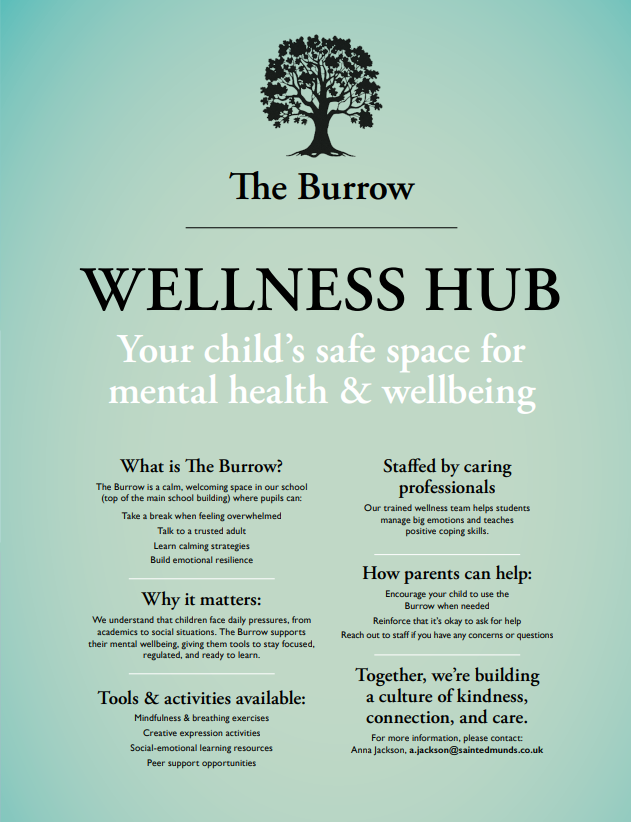Wellbeing
Wellbeing At St. Edmund’s
Ensuring that our students are healthy, in body and mind, is of upmost importance at St. Edmund’s.
As a school we are very aware of the pressures that our young people are under, so it is important that the environment around them is a happy and healthy one and that they feel safe and secure, both physically and mentally.
The wellbeing of your child is imperative and school life can influence many dimensions of this. At St. Edmund’s we not only provide a good academic and physical education but also endeavour to nurture and support your child through the social and emotional aspects of life. Whether this be playground friendships, new challenges or family matters. We believe that every pupil has the right to be heard and that this allows them to feel understood. If your child is thriving emotionally, they are able to thrive in the other aspects of their life too.

Even as our school grows we are able to really get to know your children. There is a whole school approach to wellbeing at St. Edmund’s from Dr Walliker and the web of pastoral support, from Heads of Years and Tutors, to academic, sports and support staff. Staff are quickly attuned to when a child seems to be struggling and we meet regularly to share concerns and recommend interventions. This approach is supported through our PSHE programme, music, drama and sporting events, as well as community activities. We have a dedicated Health Centre which is integral to our pastoral provision and can provide a safe haven when pupils feel they need time and space to process their emotions. In addition, we offer a counselling service for pupils who may wish to talk with a trained professional who can help to support them.
We have a dedicated ELSA (Emotional Literacy Support Assistant) team of six to support the emotional needs of our pupils. We deliver individualised support programmes to meet the emotional needs of our pupils. We recognise that children learn better and are happier in school if their emotional needs are addressed.

We aim to make a difference through our consistent approach and sessions are provided with regularity in a welcoming space in the main school building, in order to enable continuity of support. We liaise regularly with our teachers in order to discuss progress and check whether new skills are being transferred to class. As part of our role pupils are helped to find their own solutions rather than us telling them what to do!
We hope that through this school community approach we will provide the children with the opportunities to be responsible for their own wellbeing and recognise when they need support.

The Burrow – a wellbeing space for every pupil at St. Edmund’s School
At St. Edmund’s we understand that pupils thrive and are ready to learn when they feel safe, supported, and understood. That’s why we’ve created the Burrow, a dedicated wellbeing room available to all our Prep and Senior pupils from 8.15am - 4.30pm.
What is the Burrow?
The Burrow is not a ‘time out’ space, but a ‘time in’ space, designed to help pupils reset and regulate their emotions, rather than withdraw from school life.
When children feel seen, heard, and accepted, they are better able to cope with challenges and return to their learning with confidence.
Why does it matter?
All emotions are valid, but sometimes it can be hard for a pupil to know what they’re feeling and why. This can result in non-verbal expressions, such as vague feelings of being ‘unwell’, tuning out of learning or making choices they wouldn’t ordinarily make.
Having a space within school for quietness when pupils feel worried about little things, or when overwhelmed with big emotions, means that all pupils are nurtured.
For those who don’t wish to talk and simply want to take a moment to reflect, we can support that need too. Our wellbeing room is not about fixing everything, or avoiding lessons, it’s about creating space for every child to feel safe and supported while in school.
How does it help learning?
When pupils are struggling emotionally, they may appear attentive in class but are unable to absorb what’s being taught.
By visiting the Burrow, they demonstrate resilience through recognising their emotions and seeking support rather than disengaging. This self-awareness and time to reflect empowers pupils, so that when ready, they return to class ready to learn.
Our commitment
In the Burrow, our team is consistent, present, and caring. We listen, notice, and respond with empathy. Behaviour is a form of communication, and we believe that when pupils feel seen and supported, they can navigate their emotions and strengthen their resilience. The result is a child who is enabled to learn with focus and determination.
The Burrow Team
The Burrow is staffed by Mrs Jackson, Ms O’Shea, Mrs Taylor and Mrs Noble. A highly qualified and experienced team of wellbeing specialist Teaching Assistants, ELSA’s (Emotional Literacy Support Assistants) and Youth Mental Health First Aider’s.



